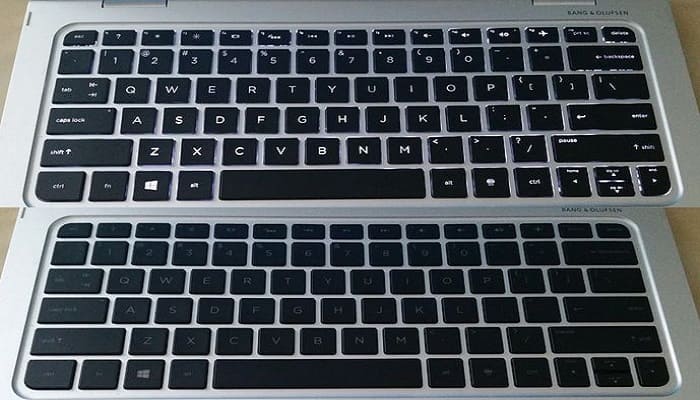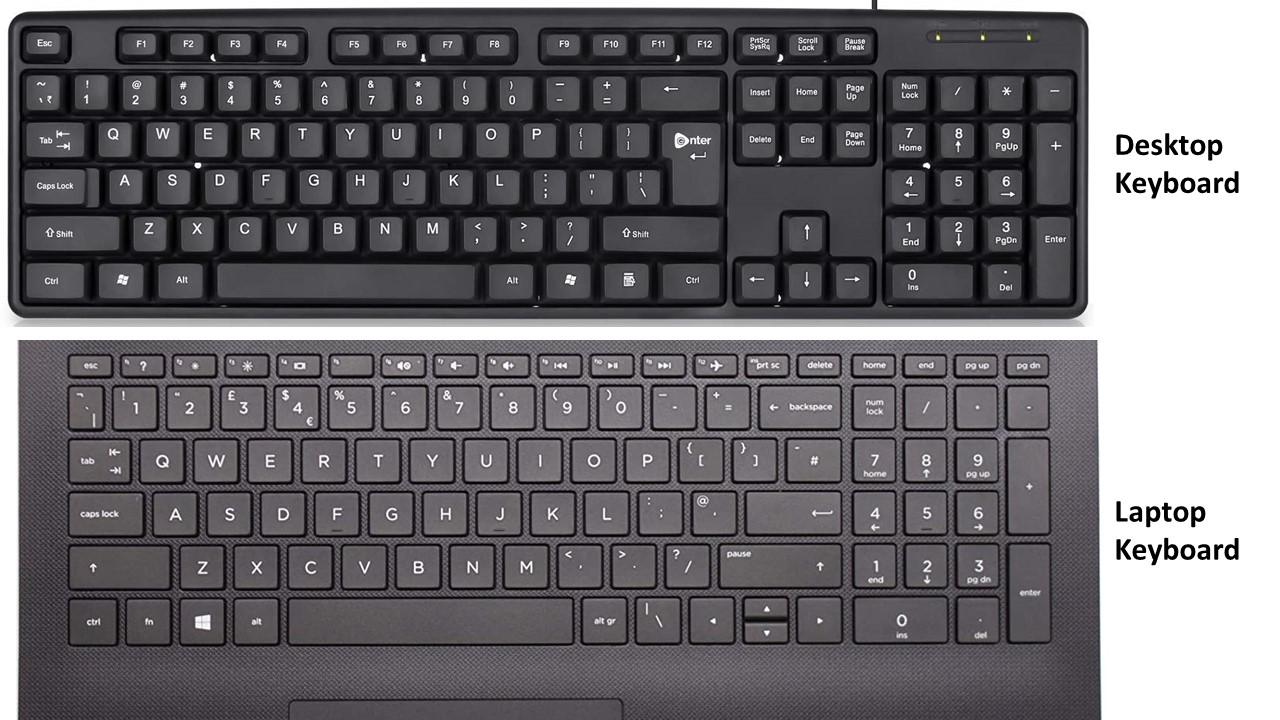Keyboard is an essential input device for both a desktop computer and a laptop computer as well. Though the purpose of the two is the same, but there are some differences between them in terms of design, features and resulting convenience in usage.
It is important for a user to know about these differences especially when they need to make a choice between a laptop and a desktop computer on the whole.
In This Article
KEY TAKEAWAYS
- The arrangement of keys is different in the two types of keyboard due to the size factor. The compact design of a laptop keyboard may not be comfortable for all, especially when one needs to type a lot and type very fast.
- Due to the small size of the laptop keyboard, in most models there is no separate number keypad which may cause inconvenience while punching in numbers fast.
- The laptop keyboard along with the mouse, or trackpad, is in-built on the base but desktop keyboards and mouse are separately connected via USB or wirelessly sometimes.
5 Differences Between Laptop and Desktop Keyboard

1. Arrangement of Keys
The keys on a laptop keyboard are arranged closely and in a different way than it is on a desktop keyboard. This is done to accommodate the small footprint of the laptop and utilize the smaller real estate to the fullest.
Alternatively, the keys on a desktop keyboard are arranged in a more generous way on a larger space that enables easy typing, and even faster typing at times.
2. Difference in Sizes
The size of the keys on a desktop keyboard is much larger as compared to the keys of a laptop keyboard. This is because there is no space limitation to accommodate the number of keys.
On the other hand, the chassis of a laptop computer is itself very small in size. It is for this reason there is a difference in size of the laptop keyboards.
This means that the size of the individual keys on a laptop keyboard will be much smaller compared to a desktop keyboard.
3. Built
The desktop keyboard is an external input device attached to the system, just as the mouse.
To use and type on it, the keyboard is attached to the CPU through a cable. However, modern technology allows the desktop keyboards to connect wirelessly as well.
On the other hand, the laptop keyboard is built-in. There is also a touchpad that acts as the mouse.
However, if you are not comfortable in using the built-in keyboard of a laptop, you can also use an external keyboard and mouse, wirelessly connected or otherwise, for your convenience.
4. Function Key
In a laptop keyboard there is a specific ‘Function’ key, often denoted by ‘Fn.’ This ‘Fn’ key is meant to perform some special functions and is normally used simultaneously with other keys.
For example, when you press the ‘Fn’ key along with the up or down arrow key it will increase or decrease the brightness of the screen respectively.
The desktop keyboards will usually not have such special function keys, though some manufactures, like Dell, may have specific desktop keyboards in their product category that comes with a function key.
This is done to make the keyboard look just like a laptop keyboard providing more convenience to the users and ensuring smooth flow when they switch between keyboards.
5. Numeric keypad
There is a numeric keypad on a desktop keyboard. This allows you to input numeric commands to the computer system much easily and quickly.
The laptop keyboard will however not have a dedicated numeric keypad in its design. This is once again done to save space.
Which is Better – Laptop or Desktop Keyboard?

It depends on whichever keyboard you are comfortable to use.
If you are used to typing on a desktop keyboard, which is larger in size and comes with bigger keys, you may find it difficult in using a laptop keyboard, due to the proximity of the individual keys, and maintain accuracy in typing.
If you can adjust, you can use both, but if you cannot, it is better that you stick to your traditional desktop computer.
Even if you buy a laptop, you can connect a wireless desktop computer and use it for your convenience.
The size, spacing and functions of the different keyboards also matter.
Some users may find typing on a laptop keyboard is much easier compared to a desktop keyboard.
For them, the closeness of the keys is better because it eliminates the chances of missing out a key or pressing one key wrongly.
If you are not comfortable typing on a smaller keyboard, you can use a laptop that comes with an 11.6 inches screen.
This will typically have a full-size keyboard. This will ensure an improved precision of the keystrokes.
If you really want to choose to use a laptop keyboard instead of a desktop keyboard, make sure that:
- The keys are concave in shape and not flat to ensure that your fingers find the center of the keys easily without having to look down at the keyboard while typing.
- There are standalone keys such as Home, Page Up, Page Down, and End as that will help you more if you do a lot of typing and text manipulation.
- There is backlighting to enable you to see the keys clearly in the dark while typing. However, such a choice will depend on your work timing, working requirement and environment.
- The keys offer greater resistance when you press them. This will ensure a better and higher tactile feedback to your finger. If it doesn’t, you will never know when a key is pressed and released. You will usually have a tendency to re-press it, which is the main reason for typos.
- The throw of the keys or travel time is not short. It should go far down when you press the keys to make it comfortable to type. Most laptops come with keyboards with shorter travel time due to the slim and sleek frames.
Finally, check the flex on the laptop keyboard. This indicates the bend at the base of the keyboard.
You can check it by pressing the G and H keys in the middle.
If it has a lot of flex, it will bend inwards. This is bad because it will alter the force feedback needlessly which will affect your typing and accuracy with little support from beneath.
Ideally, when you choose a keyboard, you cannot possibly go wrong.
However, which is better among a desktop and a laptop keyboard will entirely depend on your typing style.
Choose one that will enhance your productivity and ensure accuracy in typing while keeping your fingers smiling and painless.
Conclusion
Desktop keyboards and laptop keyboards differ in several aspects apart from the size of each.
Irrespective of which type you choose, make sure that you check the travel, functionality, tactility and overall comfort in typing.
Remember, what may work for others may not work well for you.